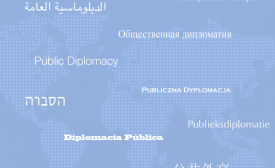A new study finds almost two-thirds of world leaders now have a Twitter account, but many don't bother to follow each other. The "Twiplomacy" study Thursday by PR firm Burson-Marsteller says President Barack Obama is the most-followed world leader, including by 76 of his peers and other governments.
Current challenges
To meet the challenges of the 21st century, the approach to public diplomacy will increasingly focus on smart networks of influencers who can convene, connect and mobilize communities. This collaborative approach will support and aggregate the impact of smart, committed individuals around the world.

In the latest CPD Perspectives paper, titled "Practicing Successful Twitter Public Diplomacy: A model and case study of U.S. efforts in Venezuela," Erika Yepsen examines the role Twitter can play in public diplomacy, and how current policy needs to adapt to enable government to capitalize upon the benefits of the technology to engage effectively online.
By Zachary Devereaux and Thomas Ledwell, Nexalogy Environics
Digital diplomacy can be defined as the use of social networks by states and civil society to further foreign policy goals and influence public opinion, and the AFP e-diplomacy hub shows this in real-time, collating tweets from heads of state and government, diplomats, experts, foreign correspondents and activists from more than 150 countries.
The app displays the most-used hashtags, measures an individual’s influence (think Klout), and maps the relationships between these important figures. The e-diplomacy hub is an effective way to show which figures are talking about what issues, and where these public diplomatic dialogues are taking place.
Like any powerful tool, the Internet can be used for both good and evil, by citizens and governments alike. It is so powerful that the US State Department is actively tapping social media for public diplomacy. Just check out “It’s me, Kristie” – the blog of Kristie Kenney, the former US ambassador to Manila who’s now assigned in Bangkok.
She said that rumors in South Korea that the U.S. was exporting cows infected with mad cow disease spread through SNS, fueling anti-U.S. sentiment and nation-wide protests, and hindering free trade negotiations between the two countries. Esser said in such cases, however, the majority of the online community tends to shout down the extremists, working as a “self-correcting mechanism.”







